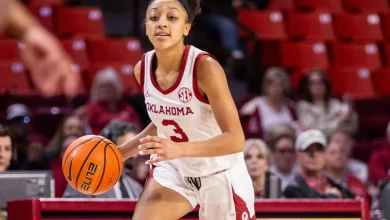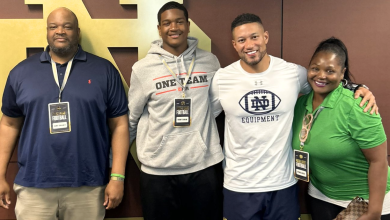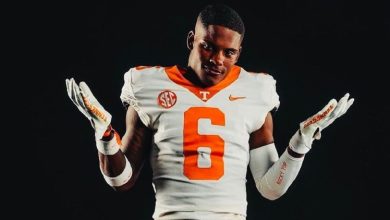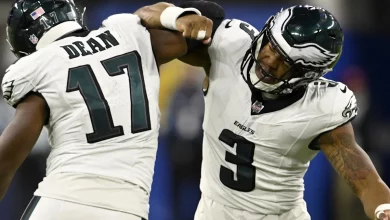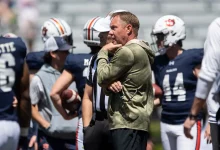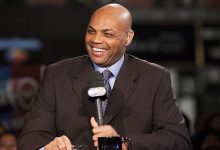College Coaches Reveal Thoughts on Nico Iamaleava After Inconsistent Season
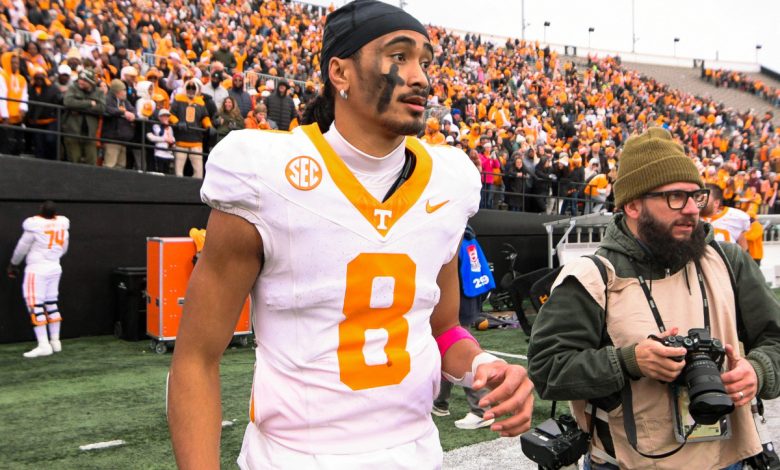
College Coaches Reveal Thoughts on Nico Iamaleava After Inconsistent Season
Nico Iamaleava was one of the most highly anticipated quarterbacks to enter college football in recent memory. With a strong arm, athleticism, and a reputation as a future star, the young signal-caller committed to the University of Tennessee, where he was expected to help elevate the Vols’ football program to new heights. As a five-star recruit, Iamaleava’s expectations were set sky-high. However, his first season as the starting quarterback for the Tennessee Volunteers was marked by inconsistency, leaving fans and analysts to wonder if he could live up to the hype.
Despite moments of brilliance, Iamaleava’s performance over the course of the season wasn’t always what many expected. With some games that showcased his incredible potential and others that raised concerns, the debate surrounding his development and future has become a focal point for coaches, players, and pundits alike.
As part of a deep dive into Iamaleava’s freshman season and the outlook for his future in college football, several college coaches—both from within the SEC and beyond—were asked to share their thoughts on the highly touted quarterback. Their insights provide valuable perspective on where Iamaleava stands after a somewhat inconsistent season, as well as what his growth might look like in the coming years.
The Expectations Surrounding Nico Iamaleava
When Iamaleava first made the decision to play for Tennessee, expectations surrounding him were enormous. He arrived as the top-rated quarterback in his recruiting class, with an impressive resume of high school performances that had the college football world buzzing. His combination of size (6’5”, 200 pounds), arm strength, mobility, and natural athleticism gave him the physical tools to be an elite quarterback at the next level.
For Tennessee fans, who had long been yearning for a franchise quarterback to lead their team to sustained success, Iamaleava seemed like the perfect solution. His ability to make all the throws—whether deep down the field or on short, precision passes—along with his mobility in the pocket, made him a prototypical quarterback for today’s fast-paced, high-flying offenses.
As with all young quarterbacks, Iamaleava was expected to have some growing pains during his first season. But the sheer talent he possessed suggested that, even in those early struggles, flashes of brilliance would make his development worthwhile. Unfortunately, those flashes weren’t always consistent, and Iamaleava experienced the growing pains that often accompany the transition from high school to college football.
Inconsistent Play on the Field
Iamaleava’s freshman season had its highs and lows. He showed signs of elite potential during key moments, displaying remarkable poise in critical situations and the ability to throw the football with velocity and accuracy. But he also had stretches where his decision-making was suspect, his accuracy was inconsistent, and his performance appeared overwhelmed by the speed and complexity of college defenses.
One of the most memorable performances of Iamaleava’s season came against a highly-ranked SEC opponent, where he led his team to a dramatic comeback win. In that game, he showcased his rocket arm, making several deep throws down the field that seemed to defy the laws of physics. However, in other games, he struggled to make basic reads and was intercepted multiple times in crucial moments. His highs were undeniable, but the lows raised legitimate questions about his readiness for the challenges of the SEC.
In one game, he threw for over 350 yards and four touchdowns, leading the Volunteers to a dominant victory. In the very next contest, Iamaleava had a subpar outing, throwing for under 150 yards and committing three turnovers in a loss. Such inconsistency is typical for many young quarterbacks, but for someone who entered the season with lofty expectations, it left both fans and analysts searching for answers.
Coaches Weigh In on Nico Iamaleava’s Development
To gain a broader perspective on Iamaleava’s performance, several college coaches were consulted for their take on the young quarterback’s progress. Coaches from both the SEC and other Power 5 conferences shared their observations on Iamaleava’s growth and potential. While opinions varied, a few consistent themes emerged.
1. Physical Tools Are Undeniable
One of the most commonly repeated sentiments from coaches was that Iamaleava’s physical tools were undeniably elite. His size, arm strength, and athleticism made him a matchup nightmare for defenders. Many coaches were quick to point out that, despite his inconsistency, Iamaleava had one of the strongest arms in college football.
A coach from an SEC rival stated, “The kid’s got everything physically. He can make every throw you need, and he’s got the legs to extend plays or run when needed. If you’re looking for a prototypical quarterback in today’s game, Nico’s got that potential.”
Another coach from a top-tier Big Ten program added, “It’s not just the arm strength. His ability to make throws on the run is impressive. A lot of quarterbacks can’t throw like he does when they’re moving outside the pocket. Nico has that next-level talent.”
The consensus among coaches was clear: Iamaleava has all the tools to be an elite quarterback at the next level. His size and physicality make him a potential NFL prospect, and his ability to make spectacular throws means that his ceiling could be incredibly high. However, they also cautioned that a quarterback with his kind of talent needs to refine other aspects of his game to reach that potential.
2. The Need for Better Decision-Making
Despite his obvious talent, one of the areas where coaches felt Iamaleava needed the most improvement was his decision-making. His tendency to force throws or take unnecessary risks led to turnovers and missed opportunities for his team. This issue is not uncommon for young quarterbacks, particularly those transitioning to a power conference like the SEC, where defenses are quicker, more complex, and more disciplined.
An SEC defensive coordinator remarked, “When you’re dealing with a freshman quarterback like Nico, you know he’s going to be prone to some mistakes. But his decision-making is still a bit raw. There were times when he locked in on his first read and didn’t do a good job of progressing through his options. You can get away with that in high school, but in the SEC, defensive backs are too good.”
This tendency to lock onto one receiver or make forced throws became a theme throughout Iamaleava’s season. While his arm strength allowed him to get away with some of these risky throws, college defenses were quick to capitalize on mistakes. If Iamaleava is to take the next step in his development, he must improve his mental processing and his ability to read defenses more effectively.
Another coach from the ACC said, “You can see the flashes of brilliance, but consistency is key. There were times when Nico would take unnecessary risks, and it cost him. But that’s what you expect from a young quarterback. He’ll learn to trust his process and take what the defense gives him.”
3. Understanding the Speed of the Game
A significant challenge for young quarterbacks is adjusting to the speed of the game at the college level. In high school, Iamaleava was able to rely on his physical tools to outmatch opponents. However, college defenses are much faster, and the game is more mentally demanding. Iamaleava’s ability to process information quickly and adjust on the fly was another area that coaches highlighted as needing improvement.
“Every quarterback goes through that adjustment period,” said an SEC offensive coordinator. “It’s about learning when to take chances and when to play it safe. Nico’s arm is such a weapon that he doesn’t always realize he doesn’t need to force throws. He’s got to learn to be patient and understand that sometimes the best play is just taking what the defense gives him.”
For Iamaleava, this is an area that will only improve with experience. His first year in college football was likely a crash course in how fast the game can move, and as he gets more comfortable in the system and gains a deeper understanding of defensive schemes, his ability to make quicker, more accurate decisions should improve.
4. Coaching and Development Will Be Key
Several coaches pointed out that Iamaleava’s development will depend heavily on how well he is coached moving forward. With Tennessee’s coaching staff, led by head coach Josh Heupel and offensive coordinator Alex Golesh, Iamaleava is in good hands. Heupel’s fast-paced, high-octane offense is built for quarterbacks like Iamaleava, who thrive in a system that emphasizes quick throws and the ability to stretch the field vertically.
“Josh Heupel runs a system that is perfect for a quarterback with Nico’s skill set,” said a coach from the SEC. “He doesn’t ask his quarterbacks to sit in the pocket for five or six seconds. He gives them opportunities to make quick decisions, get the ball out fast, and let the offense flow. If Nico can get more consistent in reading defenses, he could be a great fit in that system.”
With continued development under Heupel’s guidance, Iamaleava should have the opportunity to refine his skills, particularly in terms of reading defenses, making quicker decisions, and finding a rhythm in the offense. The potential for growth under a coach like Heupel is immense, and many coaches believe that Iamaleava’s best football is still ahead of him.



